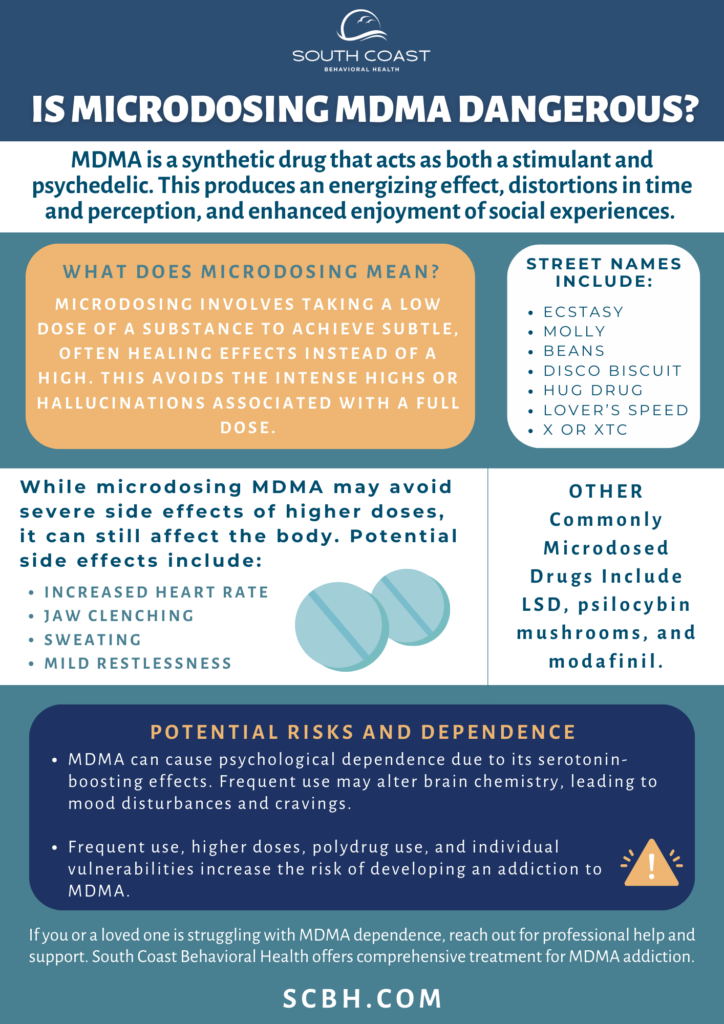What Is MDMA?
MDMA, short for 3,4-methylenedioxymethamphetamine, is a synthetic psychoactive drug with both stimulant and hallucinogenic effects. It is popularly known by street names such as “Ecstasy,” “Molly,” or “E.” MDMA was first synthesized in 1912, but it gained widespread popularity as a recreational drug in the 1980s and 1990s, particularly within the rave and nightclub scene. Some choose to engage in a kind of use called microdosing when users only use a small amount of the drug. Is microdosing MDMA dangerous? It depends on a number of factors.
When ingested, MDMA increases the release of several neurotransmitters in the brain, including serotonin, dopamine, and norepinephrine. This leads to feelings of euphoria, heightened senses, increased sociability, empathy, and emotional closeness with others. The drug also has stimulant effects, causing increased energy, alertness, and physical activity. For this reason, it tends to be very popular as a party drug.
MDMA is classified as a Schedule I substance in the United States, meaning it is illegal to manufacture, distribute, or possess the drug due to its high potential for abuse and lack of accepted medical use. However, some researchers have been exploring the potential therapeutic applications of MDMA for post-traumatic stress disorder (PTSD) and other mental health conditions.
What Does Microdosing Mean?
Microdosing means taking a very small fraction of a normal recreational dose – one definition has this as 1/5 to 1/20. In the context of microdosing MDMA, this would be taking anywhere from 24 to 6 milligrams, since a standard recreational dose of MDMA is around 125 milligrams.
The idea behind microdosing is to benefit from the positive effects of psychedelics like MDMA without the negative side effects. The idea started in Silicon Valley, as developers began experimenting with microdosing MDMA and other drugs as a way to boost creativity.
Microdosing MDMA and other mood-altering drugs is also argued by some to be an effective treatment for mental illness. For example, Australia recently started allowing patients with depression to microdose MDMA under the supervision of a doctor.

Is Microdosing MDMA Dangerous?
Taking any illicit substance can be harmful. Moreover, the long-term cognitive impacts of MDMA are unclear at this time. Therefore, you would be taking a risk by microdosing MDMA on a regular basis.
There’s also the question of purity. Unlike in Australia, the Food and Drug Administration is still currently evaluating the idea of microdosing MDMA as a form of mental health treatment. That means it’s not available in a pure and regulated form that you know is safe. As a result, your only other choice would be to buy the drug on the street, in an illicit form. Substances bought on the street are more likely to be laced with other, more potent, drugs like fentanyl, ketamine, or methamphetamine.
What are the Effects of MDMA?
Effects of MDMA include:
- Euphoria and increased emotional warmth
- Enhanced sensory perception
- Increased energy and sociability
- Heightened empathy and feelings of closeness
- Mild hallucinogenic effects
- Anxiety, agitation, and paranoia (in some cases)
- Dehydration and hyperthermia
- Jaw-clenching and teeth grinding
- Nausea and loss of appetite
Effects associated with regular MDMA use include depression, sleep issues, difficulty concentrating, impulsivity, and low appetite.
It’s important to note that MDMA can be dangerous when taken in large doses or combined with other substances. Additionally, the long-term effects of MDMA use are not yet fully understood, but some studies suggest that it may have negative consequences on mental health and cognitive function.
Is MDMA Addictive?
It’s important to make clear what we mean by “addictive.” Many people use the term to denote physical dependence, associated with “hard” drugs like heroin or methamphetamine. According to the National Institute on Drug Abuse, MDMA does not induce physical dependence.
However, physical dependence is not the only facet of addiction – a drug can be psychologically addictive as well. MDMA “comedowns” can be harsh, with the person suffering from low levels of serotonin and dopamine, resulting in depression. Some users may resort to microdosing MDMA to avoid these harsh comedowns.
If you’re microdosing MDMA and want to stop but feel you can’t, you may need to reach out for help from an addiction specialist. Without knowing the long-term negative effects of microdosing MDMA, your safest option is to quit.
South Coast Behavioral Health provides various treatment programs for stimulant addiction. Call us today at 866-881-1184 to learn how we can help.
REFERENCES:
- Australia to allow prescription of MDMA and psilocybin for treatment-resistant mental illnesses | Health | The Guardian
- What are the effects of MDMA? | National Institute on Drug Abuse (NIDA)
- MDMA for the treatment of mood disorder: all talk no substance? – PMC
- Drug Fact Sheet: Ectasty/MDMA – DEA
- Drug Scheduling – DEA
- Is MDMA Addictive? | National Institute on Drug Abuse – NIDA
- MDMA-assisted therapy for severe PTSD: a randomized, double-blind, placebo-controlled phase 3 study | Nature Medicine











